EC urged to keep circular economy package
Members of the waste industry have written to the European Commission’s (EC) newly-appointed Commissioner for Environment, Maritime Affairs and Fisheries, Karmenu Vella, urging him to retain the European circular economy package, which is reported to be set for ‘review’.

Released in July by the previous administration of the EC (which was replaced on 1 November), the draft circular economy package features a proposed 70 per cent recycling and reuse target for 2030, as well as a requirement to increase the recycling rate for packaging waste to 80 per cent by 2030 (with interim targets of 60 per cent by 2020 and 70 per cent by 2025) and a ban on the landfilling of recyclable plastics, metals, glass, paper and cardboard, and biodegradable waste by 2025.
The previous administration claimed that adopting the new targets would create 580,000 new jobs, while making ‘Europe more competitive and reducing demand for costly scarce resources’. The package was largely welcomed by the waste and resources industry, with Keep Britain Tidy’s Chief Executive Phil Barton saying that the legislation package was ‘a monumental step forward’.
However, there have been reports circulating that the new administration wishes to review, if not repeal, the package. This is in addition to concerns that the EC could stall on implementing plastic bag reductions targets, also proposed by the previous administration.
FEAD letter
Writing on behalf of waste management associations in 18 members states, David Palmer-Jones, President of FEAD (the European federation of waste management and environmental services), and Secretary General Nadine de Greef, wrote to the commissioner voicing concern over the draft list of the European Commission's 2015 Work Programme, published on 7 November 2014 under the theme of ‘A Resilient Energy Union with a Forward-Looking Climate Change Policy’.
Specifically, the letter outlines unease over recurrent initiatives relating to the waste package being slated ‘for review’, and the ‘critical supporting initiatives on the Eco-design and labelling directives, part of the Commission's Circular Economy Package, [being] listed under the REFIT initiatives [the regulatory fitness and performance programme], indicating that rather than being enhanced and made fit-for-purpose in relation to material efficiency, these latter directives will instead be repealed’.
The letter reads: ‘Waste management plays a key role in achieving a resource efficient Europe by turning waste into a valuable resource and thus improving the resource resilience of the EU's industrial base. These benefits have been recognised by our sector and we see the Circular Economy as a logical evolutionary step in European business models and business practices.
‘The Commission’s leadership in this policy area as well as in a long-term European industrial strategy creating growth and jobs is essential to create the right market dynamics to turn the Circular Economy into reality.
‘Therefore, FEAD's members have welcomed the Commission’s package of proposals designed to promote a more circular economy and improve the efficiency with which resources including waste are managed in Europe. The direction of travel and the level of ambition set out in these proposals can only be applauded… FEAD is aware that some of the detailed provisions in the Commission proposal need to be fine-tuned so as to make them practical and feasible. However, rather than withdraw the Circular Economy package, FEAD members strongly believe it should be retained, with certain modifications to improve its effectiveness.’
The modifications FEAD suggests include:
- placing more emphasis on measures such as eco-design, green public procurement and the creation of stronger demand for recycled raw materials in the EU to ‘build and sustain viable markets for secondary outputs’;
- harmonising data gathering, reporting and definitions of recycling targets, including defining the calculation method of targets, to better compare member state performance; and
- improving the implementation of waste legislation at national level and reducing the current disparities.
FEAD concludes: ‘Above all, we urge that the coherence of the Circular Economy package is not compromised, but is properly reflected in the Commission Work Programme under consideration.’
The Secretary-General of the European Environmental Bureau (EEB), Jeremy Wates, has also written to Europe's Prime Ministers urging them to support the circular economy package and clean air proposals.
He stated that withdrawing the proposals would represent “an extraordinary inefficiency in a body which claims to believe in better regulation” and would “seriously undermine the credibility of the EU as a decision-making body”.
He added: “The Commission might like us to believe that by withdrawing these proposals, it would be responding to public demand for less intervention from Brussels. In fact successive polls show considerable public support for action on the environment. Both the Air and Waste Packages can deliver considerable economic and environmental benefits, with the former protecting human health and the latter creating large numbers of jobs.
“Protecting the environment is clearly nowhere near this Commission’s agenda. But placing it on the sacrificial altar of deregulation is a big mistake. 400,000 people will continue dying prematurely every year because of air pollution and we will miss the boat when it comes to becoming a green, circular economy.”
Next steps
According to a letter written by EC President Jean-Claude Juncker and First Vice-President Frans Timmermans to President of the European Parliament Martin Schulz and President of the Council of the European Union Matteo Renzi on Wednesday (12 November) the Work Programme for 2015 will include, amongst other proposals, the following:
- a jobs, growth, and investment package;
- a review of the Europe 2020 strategy;
- a follow-up to the 2030 energy and climate package (agreed in October);
- ‘actions to strengthen energy security’;
- implementing new banking supervisory and resolution rules, and completing the financial services regulatory framework;
- measures to combat tax fraud and tax evasion;
- a ‘reasonable and balanced free trade agreement’ with the United States;
- new policy on legal migration and implementing the common asylum policy; and
- reviewing legislation for the authorisation of genetically-modified organisms.
Timmermans said: "People all around the EU are telling us they want change. They want Europe to focus more where it can help solve the big problems: jobs, growth and fairness in our societies. Citizens want Europe to improve their lives, not meddle with them. Businesses want Europe to enhance their competitiveness, not burden them with red tape. This commission is committed to a fresh start, with a better prioritisation in what we do and a better way of doing it.
“Our first work programme will concentrate on a limited set of concrete initiatives which can make a positive difference for citizens. And, for the first time, we will work in dialogue with both the European Parliament and the member states to build support for our programme, because proposals are only useful if they are adopted, accepted and implemented properly on the ground."
He will oversee the process of preparing the 2015 Work Programme, which is expected to be adopted in ‘mid-December’.
Find out more about the circular economy package or read the FEAD letter.










